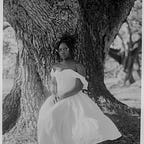Invocation for our Celie-ness, our Netties, our Sophias and our Shugs (for Exhale Collective Brunch)
Alice Walker wrote The Color Purple to tell the story of her step-grandmother Rachel. For Walker not only does Celie exist, but there is a foundational Celie-ness inside all black women that needs to be heard, held and tended to. And the root of this Celie-ness is grounded in the intersections of race, gender and class — What Mister, the story’s figure of patriarchal power, sees as “nothing-ness,” Celie shores up as the expansiveness of her existence.
Ya’ll know the moment when Mister says:
“Look at you. You black, you pore, you ugly, you a woman.
Goddam . . . You nothing at all.”
& Celie responds “I’m poor, I’m black, I might even be ugly, BUT im here”
As Barbara Christain illuminates:
“Contrary to Mister’s statement then, that because Celie is black, poor, and a woman, she knows nothing, contrary to the assertion that powerlessness means ignorance, Celie must know a great deal in order to survive. The powerless are particularly attuned to those who possess more power than they do. For the powerless, knowledge is essential to survival.” (“What Celie Knows that You Should Know” in New Black Feminist Criticisms)
Celie’s journey begins in pain, abandonment, violence and trauma. She is lied to and derided for being born black and a woman. Her body is violated and she is the only one punished for the transgression. She protects her sister, Nettie, fiercely. Her body is traded in the place of Nettie’s in hopes that Nettie might pursue an education and a life without suffering. Loosing Nettie, Celie looses hope, that she don’t find again until Sophia comes into her life on Harpo’s arm. and in this woman who has won the warmth and security of a man’s love without bending or breaking her self into smaller parts; Celie catches a glimpse of possibility. Then comes Shug Avery and suddenly the heart of Mister’s harshness comes into view. Mister has lost a woman he loved but could never own. And Shug shakes her shimmy all around them. Celie gets as caught up as Mister and before they know it, a kind of knowing tenderness special to the bond between black women blossoms between Shug and Celie.
Shug introduces Celie to a personal God. A God that knows and loves pleasure. a God that created all that we see. a God that created The Color Purple. And through Shug’s teachings Celie comes to know herself more fully. She develops a skill. She develops independence. And even as the shape of family continually shifts and redefines itself around her, with that sense of independent and direct commune with a living God, Celie finds peace and faith in her own existence.
In a way Celie is on a Hero’s journey. Moving through obstacles in constant conversation with God, trying desperately to make sense of the world around her, and make sense of herself in that world. Along this journey she meets pillars of possibility in the form of the black women she comes to know intimately. They each hold a key, a part of what she needs, to get to a place akin to freedom.
As we gather here to exhale, to breathe, let us consider: Who are your Nettie’s? those who you protect, those who protect your innocence, those who you find yourself in mutually nourishing caregiving relationship too. Who are your Sophia’s? The strong willed black women who stand righteous in their wholeness and teach you how to take up space. Who are your Shug Avery’s? those fire-starters who challenge you to see yourself in new ways, who love you back into your body, who remind you that god lives inside even your most private spaces? What is your Color Purple? Your treat on the eyes. Your soft blend of opposites. Your everyday reminder of the will and grace and pleasure of a higher power.
To close I want read a couple verses from “The Gospel According to Shug Avery” which is from The Temple of My Familiar the sequel to The Color Purple published in 1989.
HELPED are those too busy living to respond when they are wrongfully attacked: on their walks they shall find mysteries so intriguing as to distract them from every blow.
HELPED are those who find something in Creation to admire each and every hour. Their days will overflow with beauty and the darkest dungeon will offer gifts.
HELPED are those who receive only to give; always in their house will be the circular energy of generosity; and in their hearts a beginning of new age on Earth: when no keys will be needed to unlock the heart and no locks will be needed on the doors.
HELPED are those who are content to be themselves; they will never lack mystery in their lives and the joys of self-discovery will be constant.
HELPED are those who love the entire cosmos rather than their own tiny country, city, or farm, for to them will be shown the unbroken web of life and the meaning of infinity.
HELPED are those who love others unsplit off from their faults; to them will be given clarity of vision.
HELPED are those who create anything at all, for they shall relive the thrill of their own conception, and realize a partnership in the creation of the Universe that keeps them responsible and cheerful.
HELPED are those who love the Earth, their mother, and who willingly suffer that she may not die; in their grief over her pain they will weep rivers of blood, and in their joy in her lively response to love, they will converse with trees.
HELPED are those who know.
Meditation: Still Yourself, Uncross Your Legs and Feet, Drop Your Shoulders, Close Your Eyes — Repeat the phrase “I’m Here” aloud or in your mind until the sound becomes songs, take five minutes to free write
